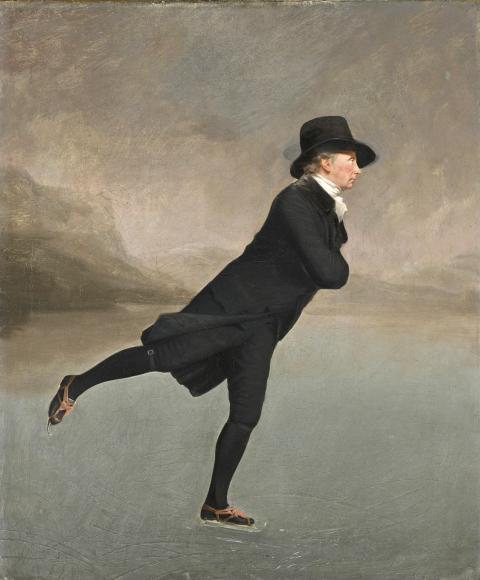Chinese practice
如臨深淵,如履薄冰
as if on the brink of an abyss, as if treading on thin ice

Photo: Wikimedia Commons
照片:維基共享資源
(ru2 lin2 shen1 yuan1 ru2 lu3 bo2 bing1)
無論人類是多麼地聰明有才智,面對大自然及週遭環境的力量,我們仍須敬畏與戒慎。上週的「活用成語」單元,我們介紹了希臘神話中的人物代達洛斯和伊卡洛斯,以及伊卡洛斯因其傲慢輕忽而導致災禍。在航行時,你必須駕馭風的力量,也要敬畏這個力量。如果你像這英文習語說的「sail too close to the wind」(太靠近風航行),船就有可能翻覆。烹飪和冶煉需要用到火,但火也有危險的成分──如果你玩火,可能會自焚。池水表面所結的冰可以讓你走過去,但你要確定這層冰的厚度夠,可以支撐你的重量,不然的話,你就會踩破冰掉下去,冰冷的水會讓你驚恐萬分,進到肺裡把你淹死。換句話說,你得要小心,不要踩在薄冰上,而且千萬不要在薄冰上滑冰,以免腳上的冰刀切破冰層。
在英文中,要警告人別陷入危險的境地,以上所提到的比喻都適用:「do not fly too close to the sun」(不要飛得太靠近太陽)、「do not tread/ skate on thin ice」不要在薄冰上踩踏∕滑冰,或「do not sail too close to the wind」(不要太靠近風航行)、「do not play with fire, or you will get your fingers burned」(不要玩火,不然你會燒傷手指)。
上週的「活用成語」也介紹了《詩經》的一段詩文,其中包括這句:「戰戰兢兢,如臨深淵,如履薄冰」(我們應該謹慎小心,如同站在深淵的邊緣,也如同踩在薄冰上)。最後一句「如履薄冰」(如同踩在薄冰上),看來似乎和英文習語「do not tread/ skate on thin ice」近乎完美地相符,因兩者都在描述情況的不穩定。然而在用法上,「如履薄冰」所表示的是惶恐的感覺;而英文「to tread on thin ice」,通常是用來警告人不可輕忽大意,行事必須極度小心。
上述出自《詩經》、四字一組的詩句,都以其原始字句原封不動流傳至今,成為現今通用的成語。「如臨深淵,如履薄冰」多一起使用,而「戰戰兢兢」多獨立使用,都是用來表示戒慎恐懼。有時「戰戰兢兢,如臨深淵,如履薄冰」三者會一起使用。
英文中也有「standing over the abyss」(站在深淵旁)的比喻,但其意並非戒慎恐懼,而是表示對未來的不確定或絕望感。
(台北時報林俐凱譯)
縣長表示,自從他上任以來,每天戰戰兢兢、戮力從公,深怕辜負了選民的託付。
(The county commissioner said that ever since he took office he has been constantly mindful of carrying out his public service to the best of abilities, to avoid falling short of voters’ expectations.)
山坡上這條路狹窄彎曲,非常危險,在會車時,我感到如臨深淵、如履薄冰,絕對不敢輕忽。
(This mountain road is narrow and winding, it’s really dangerous. I have to be really careful when we are passing oncoming vehicles.)
英文練習
treading/skating on thin ice; playing with fire
For all of the advantage of human ingenuity and intelligence, it still pays to be respectful and cautious when met with the power of natural forces and the environment around us. Last week Using Idioms looked at the Greek myth of Daedalus and Icarus, and how the latter fell afoul of incautious hubris. When sailing, you harness the power of the wind, and yet you must also be respectful of that power: if you “sail too close to the wind,” as the English idiom goes, there is a chance the boat will capsize. Fire is needed for cooking and smelting, but it is a dangerous element: If you play — or mess — with fire, you may hurt yourself. The veil of ice on a frozen pond may allow you to walk across the surface, but be sure the ice is sufficiently thick to support your weight, or you will find yourself plunged into the ice cold water beneath, your shocked lungs may fill and you could drown. Take care, in other words, not to tread on thin ice, and Heaven forbid you would skate on thin ice, and have the blades on your skates cut down into the surface.
In English, to warn somebody not to put themselves in a precarious situation, all the above metaphors apply: Do not fly too close to the sun; do not tread/ skate on thin ice, or sail too close to the wind; do not play with fire, or you will get your fingers burned.
Last week, too, Using Idioms looked at a verse from the shijing (Book of Poetry), which included the line 戰戰兢兢,如臨深淵,如履薄冰 (We should be apprehensive and careful, as if we were on the brink of an abyss, as if we were treading on thin ice). The last phrase, 如履薄冰 — as if treading on thin ice — appears to be a near perfect match for the English proverb: Both allude, after all, to the precariousness of the situation. In use, however, 如履薄冰 describes the sense of trepidation; the English “do not tread on thin ice” is generally used as a caution not to proceed, or to proceed exceedingly carefully.
In fact, all three of the four-character phrases in the above shijing quote have survived in their original form as Chinese idioms in the modern language; the latter two are used in conjunction with each other, 戰戰兢兢 on its own, to describe a feeling of fear and trepidation. Sometimes all three are used together.
English also has a use for the metaphor of standing over the abyss, but less to mean a sense of trepidation, and more to express a feeling of uncertainty or hopelessness about the future.
(Paul Cooper, Taipei Times)
You’re skating on thin ice here, you’d better choose your words very carefully.
(你這樣是讓自己身陷險境,你說話最好小心一點。)
I wouldn’t be late again, if I were you; the boss doesn’t like it. Play with fire, and you might get your fingers burned.
(如果是我,就不會再遲到了,因為老闆不高興。小心你玩火自焚。)

A: Apart from the musical Sunset Boulevard, Japanese pop diva Ayumi Hamasaki is also touring Taiwan after a 17-year wait. She’s holding two concerts starting tonight. B: Ayu has the most No. 1 hits of any Japanese solo artist, with 33 total. A: “Time” magazine even crowned her as “The Empress of Pop.” B: She staged shows in Taipei back in 2007 and 2008, causing an “Ayu fever” across Taiwan. A: Unfortunately, the singer has been deaf in her left ear since 2008, and is gradually losing hearing in her right ear. I’m so excited to see her singing in Taipei again. A: 除了音樂劇《日落大道》,日本歌后濱崎步睽違17年,今晚起在台北熱唱兩場。

Denmark’s state-run postal service, PostNord, announced that it would cease letter deliveries at the end of 2025 due to the impact of digitalization. As 95% of its residents now use the Digital Post service, Denmark has seen a 90% decline in letter volumes since 2000, from 1.4 billion to 110 million last year. On top of that, the Postal Act of 2024 removes the government’s obligation to provide universal mail service and puts an end to postal exemptions from value-added tax, raising the cost of a single letter to 29 Danish krone (US$4.20). As a result, PostNord is switching

A: After touring Taipei, the play Life of Pi is now heading to Taichung. You wanna go? B: Did you forget? We’re going to Taipei this weekend to see the musical Sunset Boulevard and go to Japanese pop diva Ayumi Hamasaki’s concert. A: Oh yeah, that’s right. The classic composed by Andrew Lloyd Webber is touring Taiwan for the first time. B: I heard that it’s adapted from a 1950 film with the same title. A: And the show will feature legendary soprano Sarah Brightman, who is finally returning to the musical stage after 30 years. We can’t miss it. A: 在台北巡演後,戲劇《少年Pi的奇幻漂流》本週起將移師台中。要去嗎?

Although sending you an SMS (Short Message Service) verification code provides some security, many apps now use code-generating apps and two-factor authentication instead. But more recently, passkeys now use a biometric approach to logging in. Biometrics can offer an even more secure alternative. Following this trend, Google is reportedly planning to replace SMS verification codes with “QR code” scanning. SMS codes are currently used to verify user identity and prevent fraudsters from creating fake Gmail accounts to distribute spam. However, these codes present several challenges. They can be phished through suspicious links, and users may not always have access